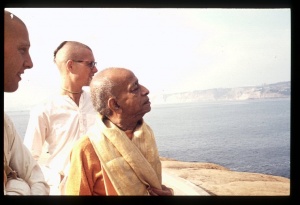CC Madhya 16.189: Difference between revisions
m (1 revision(s)) |
No edit summary |
||
| Line 1: | Line 1: | ||
{{ | [[Category:Sri Caitanya-caritamrta - Madhya-lila Chapter 16|C189]] | ||
<div style="float:left">'''[[Sri Caitanya-caritamrta|Śrī Caitanya-caritāmṛta]] - [[CC Madhya|Madhya-līlā]] - [[CC Madhya 16|Chapter 16: The Lord's Attempt to Go to Vṛndāvana]]'''</div> | |||
<div style="float:right">[[File:Go-previous.png|link=CC Madhya 16.188|Madhya-līlā 16.188]] '''[[CC Madhya 16.188|Madhya-līlā 16.188]] - [[CC Madhya 16.190|Madhya-līlā 16.190]]''' [[File:Go-next.png|link=CC Madhya 16.190|Madhya-līlā 16.190]]</div> | |||
{{CompareVersions|CC|Madhya 16.189|CC 1975|CC 1996}} | |||
{{RandomImage}} | |||
==== TEXT 189 ==== | ==== TEXT 189 ==== | ||
<div | <div class="verse"> | ||
go-brāhmaṇa-vaiṣṇave hiṁsā karyāchi apāra | :go-brāhmaṇa-vaiṣṇave hiṁsā karyāchi apāra | ||
sei pāpa ha-ite mora ha-uka nistāra | :sei pāpa ha-ite mora ha-uka nistāra | ||
</div> | </div> | ||
| Line 12: | Line 16: | ||
==== SYNONYMS ==== | ==== SYNONYMS ==== | ||
<div | <div class="synonyms"> | ||
go-brāhmaṇa- | ''go-brāhmaṇa-vaiṣṇave''—to the cows, ''brāhmaṇas'' and Vaiṣṇavas; ''hiṁsā''—violence and envy; ''karyāchi''—I have done; ''apāra''—unlimitedly; ''sei pāpa ha-ite''—from those sinful activities; ''mora''—my; ''ha-uka''—let there be; ''nistāra''—liberation. | ||
</div> | </div> | ||
| Line 19: | Line 23: | ||
==== TRANSLATION ==== | ==== TRANSLATION ==== | ||
<div | <div class="translation"> | ||
The Muslim governor then prayed for liberation from the unlimited sinful reactions he had previously incurred by being envious of brāhmaṇas and Vaiṣṇavas and killing cows. | The Muslim governor then prayed for liberation from the unlimited sinful reactions he had previously incurred by being envious of brāhmaṇas and Vaiṣṇavas and killing cows. | ||
</div> | </div> | ||
| Line 26: | Line 30: | ||
==== PURPORT ==== | ==== PURPORT ==== | ||
<div | <div class="purport"> | ||
By chanting the holy names Kṛṣṇa and Hari, one is certainly liberated from the reactions to such sinful activities as killing cows or insulting brāhmaṇas and Vaiṣṇavas. It is most sinful to kill cows and insult brāhmaṇas and Vaiṣṇavas. The karma incurred by such activity is very great, but one can immediately nullify all this karma by surrendering to Lord Kṛṣṇa and chanting His holy name. After being released from | By chanting the holy names Kṛṣṇa and Hari, one is certainly liberated from the reactions to such sinful activities as killing cows or insulting ''brāhmaṇas'' and Vaiṣṇavas. It is most sinful to kill cows and insult ''brāhmaṇas'' and Vaiṣṇavas. The ''karma'' incurred by such activity is very great, but one can immediately nullify all this ''karma'' by surrendering to Lord Kṛṣṇa and chanting His holy name. After being released from one 's sinful reactions (''karma''), one becomes eager to serve the Lord. This is the test. Since the Muslim governor was immediately purified in the presence of Śrī Caitanya Mahāprabhu, he could utter the names of Kṛṣṇa and Hari. Consequently he was eager to render some service, and the Lord, eager to fulfill his desires, immediately had the devotee Mukunda Datta inform the governor that there was some service to render. | ||
</div> | </div> | ||
__NOTOC__ | |||
<div style="float:right; clear:both;">[[File:Go-previous.png|link=CC Madhya 16.188|Madhya-līlā 16.188]] '''[[CC Madhya 16.188|Madhya-līlā 16.188]] - [[CC Madhya 16.190|Madhya-līlā 16.190]]''' [[File:Go-next.png|link=CC Madhya 16.190|Madhya-līlā 16.190]]</div> | |||
__NOTOC__ | |||
__NOEDITSECTION__ | |||
Revision as of 02:44, 18 October 2021

A.C. Bhaktivedanta Swami Prabhupada
TEXT 189
- go-brāhmaṇa-vaiṣṇave hiṁsā karyāchi apāra
- sei pāpa ha-ite mora ha-uka nistāra
SYNONYMS
go-brāhmaṇa-vaiṣṇave—to the cows, brāhmaṇas and Vaiṣṇavas; hiṁsā—violence and envy; karyāchi—I have done; apāra—unlimitedly; sei pāpa ha-ite—from those sinful activities; mora—my; ha-uka—let there be; nistāra—liberation.
TRANSLATION
The Muslim governor then prayed for liberation from the unlimited sinful reactions he had previously incurred by being envious of brāhmaṇas and Vaiṣṇavas and killing cows.
PURPORT
By chanting the holy names Kṛṣṇa and Hari, one is certainly liberated from the reactions to such sinful activities as killing cows or insulting brāhmaṇas and Vaiṣṇavas. It is most sinful to kill cows and insult brāhmaṇas and Vaiṣṇavas. The karma incurred by such activity is very great, but one can immediately nullify all this karma by surrendering to Lord Kṛṣṇa and chanting His holy name. After being released from one 's sinful reactions (karma), one becomes eager to serve the Lord. This is the test. Since the Muslim governor was immediately purified in the presence of Śrī Caitanya Mahāprabhu, he could utter the names of Kṛṣṇa and Hari. Consequently he was eager to render some service, and the Lord, eager to fulfill his desires, immediately had the devotee Mukunda Datta inform the governor that there was some service to render.